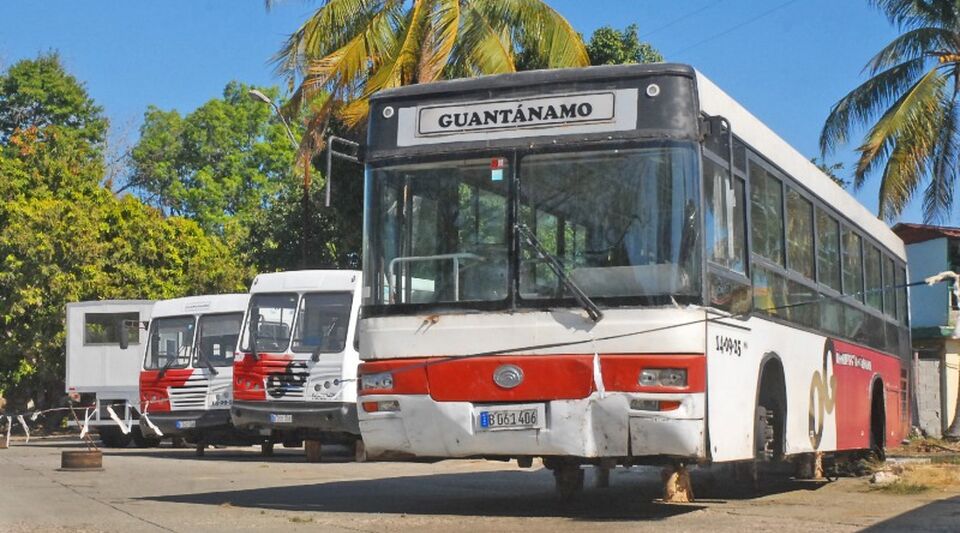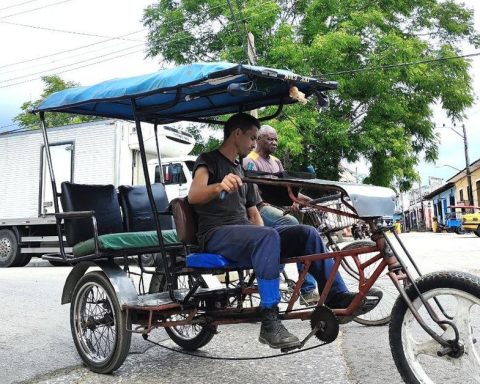The leasing of 26 “underutilized” state vehicles, with which the Guantánamo Urban Bus unit intended to cover the transport deficit in the province, has been an ineffective measure. Breaking schedules and skipping mandatory stops are characteristics of these drivers, to whom managers have threatened more than once to terminate their contracts, according to the local press.
Rubén Pico Judiones, director of this organization, lamented the origin of the problem: of the 74 buses that Guantánamo has, only 33 work. This forced them to look for alternatives and to request the lease of “paralyzed” buses from several companies -protected by the Resolution 207/2021, which facilitates vehicle rental – to cover several routes in the city and others that lead to the peripheral towns of Paraguay, Cecilia, Maqueicito, Maquey, La Jabilla, Boquerón, Cayamo and Hatibonico.
In addition, Pico details, four vans “from the private sector” were rented to connect some areas and transportation from various sectors was asked to “support” the transfer of workers. “All this is still insufficient,” admitted the manager.
“We are dissatisfied with the results,” he insists, because no matter how many measures are taken, “violations persist”
Pico points out in what conditions the drivers of leased vehicles operate. They must charge five pesos and make three trips in the morning and three in the afternoon. In addition, they have a duty to cover certain routes at a set time. “Once they comply with this, they are free to do other tasks that increase their income,” he says.
However, that kind of gap in their obligations allows them to treat the work schedule with “flexibility”. Ómnibus Urbanos began to take measures, such as inspections and “intermittent” control exercises, Pico exposes, aimed at surprising drivers during non-compliance. But even that has not resolved the situation. “There are even warnings about the possibility of rescinding contracts if violations of the regulations persist, but we are certainly still dissatisfied with the results,” he says.
It is common to see buses that circulate empty through the city with the “Leased” sign, and others that do not go to the established stops because “they prefer to transport to places that generate more income,” says Pico.
“We are dissatisfied with the results,” he insists, because no matter how many measures are taken, “the violations persist.”
As if that were not enough, these vehicles are subject to the same difficulties experienced by the entire transport sector: the need to replace tires, lack of spare parts, battery problems and lack of maintenance supplies. For that reason, he laments, “some thirty buses are parked in the unit.”
The drivers of state cars have not lived up to the crisis either. Picking up passengers at the stops “is not a favor, it is an obligation” of the leaders, Pico complains. “The population must denounce those who wander around the city empty, indicate the number of the plate and the time, to identify the alienated, and thus contribute to control through popular action.”
The executive believes that there should be a more severe law to apply to the “insensitive” who, driving cars and state buses, pass by the stops full of impatient passengers
The executive believes that there should be a more severe law to apply to the “insensitive” who, driving cars and state buses, pass by stops full of impatient passengers. Sometimes, he denounces, they don’t even stop at the signal from the inspectors. “To date, only one contract is under litigation for breach of state mandate,” he reports.
“Undoubtedly, the leasing of paralyzed buses for their repair and operation due to the new forms of management is a measure that could be effective in favor of public passenger transportation, but the demand must appear after it,” he concludes.
The newspaper of the Communist Party in the province collects the testimony of several citizens who denounce, in practice, the true seriousness of the matter. Waiting for several hours and humiliating treatment by drivers are the daily bread of travelers.
“We were confident that with the rented buses the situation would change, but the truth is that the panorama is worse and increasingly complex, for those of us who depend on public transport,” said one of the interviewees. Another affirmed that it was a “mockery” of the drivers to wander near the stops with the sign that indicates that they are rented, but refusing to pick up passengers.
The conclusion of the people of Guantanamo is clear: the State does not guarantee the “stability of urban transport” and favors -with the lack of controls and bureaucracy- the growing corruption of the sector.
________________________
Collaborate with our work:
The team of 14ymedio He is committed to doing serious journalism that reflects the reality of deep Cuba. Thank you for accompanying us on this long road. We invite you to continue supporting us, but this time becoming a member of our newspaper. Together we can continue transforming journalism in Cuba.

















